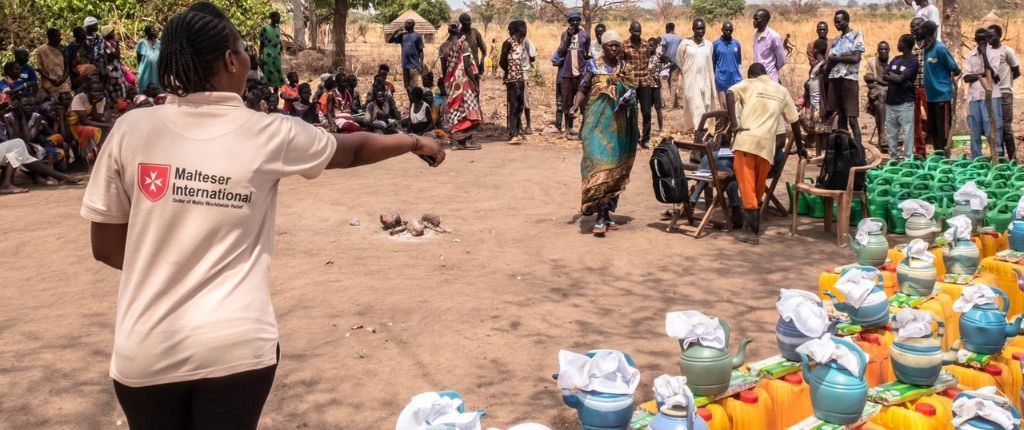
Strengthening the resilience of South Sudanese refugees in Uganda
Due to the ongoing civil conflict in South Sudan, more than 882,000 people have already fled from South Sudan to Uganda (as of June 2023). Almost all of them are finding refuge in settlements in northern Uganda, where the humanitarian situation is visibly deteriorating.
Both the people in the refugee settlements and the host Ugandan population live under extremely precarious living conditions: The food situation is tense and continues to worsen. Many people live in poverty and have hardly any possibility to make a living. Peaceful coexistence between refugees and host populations is also at risk due to increased conflicts over limited resources.
Based on our extensive experience in the project region and together with strong partners, our goal is to strengthen the living conditions of South Sudanese refugees as well as the host population in the long run with community-based approaches in the areas of nutrition, health, water and sanitation (WASH) and peacebuilding.
The crisis in South Sudan is one of the largest humanitarian crises in Africa, with nearly 2.3 million South Sudanese refugees in neighboring countries, including over 882,000 in Uganda. With continuous outbreaks of violence, increasing climate-related disasters that also fuel conflict, and political instability, the humanitarian situation remains dire in South Sudan, as well as host countries such as Uganda. With over 1.5 million refugees, Uganda is the largest host country of refugees in Africa. The vast majority of them come from South Sudan and live in areas that are among the poorest in the country.
The influx of refugees intensifies existing inequalities, challenges and conflicts over the limited resources available. The living situation of the people is highly critical. The majority of refugees in these districts have few livelihood options. More than 91% of the refugee population is classified as severely economically vulnerable. This combination of inadequate livelihoods, limited household production, and extreme poverty has led to ever-increasing food insecurity in the region, which has been significantly exacerbated by World Food Program cuts to food rations. Many refugees must resort to negative coping mechanisms.
Countless people in the settlements struggle with mental health problems in addition to dire living conditions. However, access to adequate mental health and psychosocial support is almost non-existent.
The goal of the project is to strengthen the resilience of refugees, internally displaced persons and returnees from South Sudan and the host population. To achieve this, we are taking a multi-sectoral approach in the areas of food and nutrition security, water, sanitation and hygiene (WASH), psychosocial support, peacebuilding and employment acitivities. This aims to:
- Increase food and nutrition security of smallholder farmers.
- Sustainably strengthen the health situation of refugees, internally displaced persons and returnees as well as host communities.
- Improve the mental health and psychosocial well-being of those affected.
- Promote inclusive and non-violent coexistence.
- Enable vulnerable groups in the project regions to gain vocational skills and access to financial services.
- Distribution of seeds and tools
- Trainings for smallholder farmers on effective cultivation techniques
- Establishment of home gardens
- Development of handbooks on nutritious food and how to prepare it, including joint cooking events
- Trainings for smallholder farmers on to market their produce and link to local markets
- Maintenance and operation of existing water systems, as well as preparation for handover to the state authority
- Raising awareness about menstrual hygiene
- Training of volunteers (including psychological first aid) for counseling of people in psychosocial crises (e.g. survivors of sexualized violence)
- Organization of local groups to support psychosocial well-being (including self-help groups)
- Organization and implementation of community dialogues and social events, e.g. festivals, theater
- Training and supporting beneficiaries to build alternative livelihoods
- Distribution of start-up kits as seed capital
- Establishment of savings groups and their training and equipment
Project info
Financing: BMZ, AA
Partners: TVRA, UNHCR, health and environmental authorities
Country Info
Capital: Kampala
Area: 241.040 km²
Population: approx. 48,6 million








